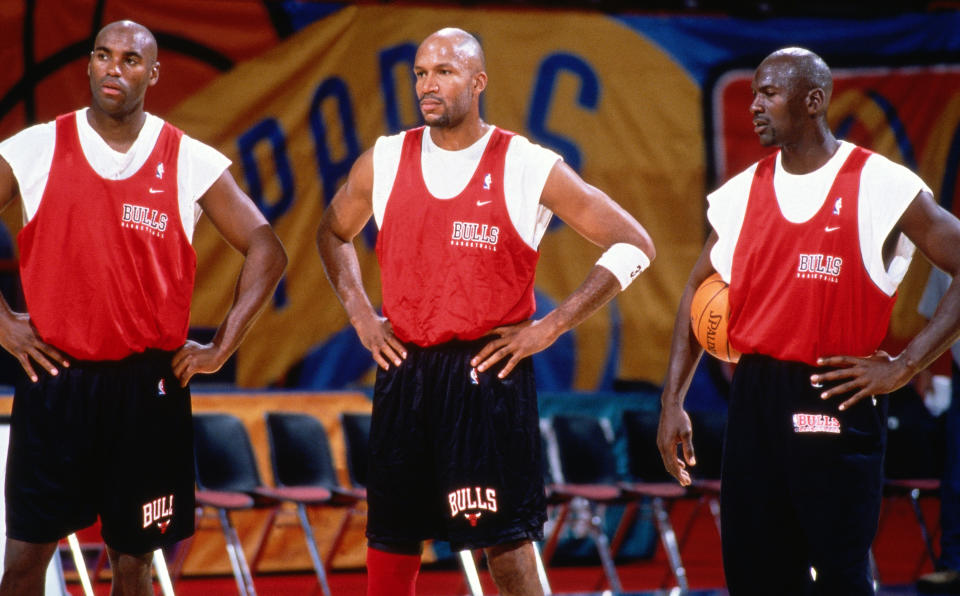Key characters you might not be familiar with in 'The Last Dance'
ESPN’s 10-part “The Last Dance” documentary on the 1997-98 Chicago Bulls spotlights the names you might imagine.
Michael. Scottie. Dennis. Phil.
But it might be the less familiar characters that will have folks talking the next five weeks. Here’s why:
Jerry Krause (Chicago Bulls general manager, 1985-2003)
If you thought Michael Jordan would portray Krause in a halfway positive light, well you don’t know Michael Jordan.
“The Last Dance” doesn’t take long before painting Krause as an attention-starved, resentful GM, including footage throughout the series of Jordan and Scottie Pippen openly berating and mocking the Bulls executive who died in 2017 at the age of 77.
Krause was GM for all six championships in Chicago had his share of issues with the three key catalysts of the Bulls run: Jordan, Pippen and head coach Phil Jackson. A former baseball and basketball scout, Krause replaced Rod Thorn in March 1985 and his relationship with Jordan was tested shortly thereafter during the 1985-86 season. Fresh off a Rookie of the Year honor and taking the NBA by storm, Jordan broke his foot during the third game of the season. If it were up to Krause and owner Jerry Reinsdorf, the risk of Jordan re-injuring his foot wasn’t worth the risk of trying to make the playoffs. Jordan returned after missing 62 games and helped the Bulls to the playoffs (with a 30-52 record) despite the front office limiting him to just 14 minutes a game.

“The mistrust Michael had with management, specifically with Jerry Krause, was he believed that they violated the most fundamental aspect of sport,” author Mark Vancil said in “The Last Dance.” “Of, I would argue, the most fundamental aspect of the way Michael conducted his life. You do it at the highest level and you do it to win all the time.”
It was downhill from that point for Krause and Jordan, culminating in the messy yet successful 1997-98 season, when the Bulls won a sixth and final championship. How Jordan and Krause lasted together for as long as they did is more a testament to winning than either man being the bigger person.
David Falk (Michael Jordan’s agent)
If it weren’t for Falk (and Jordan’s parents), the world might have never been blessed with Air Jordan. Falk worked for ProServ, an agency that repped tennis stars like Arthur Ashe and Sam Smith. “Our strategy was to try to take a team sport player and treat him more like a golfer or a boxer or a tennis player,” Falk said in “The Last Dance.”
Converse, the official shoe of the NBA at the time, told Jordan the company couldn’t elevate him over other clients like Magic Johson and Larry Bird. Adidas, Jordan’s first choice for a shoe company, told Falk they couldn’t make a shoe work at the time. That opened the door for Nike, a company at the time that wasn’t known for basketball shoes.
“I wanted Michael to go with Nike because they were the upstart,” Falk said. It took Jordan’s mom, Deloris, to get on the plane and listen to the pitch from Nike.

Falk also had a hand in naming the shoe line that is still the biggest and most popular brand in 2020.
“When I negotiated the Nike deal, I said to them, you’re a small company and if you want Michael Jordan, he’s got to have his own shoe line,” Falk said. “Nike had just come out with new technology for its running shoes called air soles. And obviously Michael played in the air and I said, ‘I got it, we’re going to call it Air Jordan.’”
Sam Smith (‘The Jordan Rules’ author and former Chicago Tribune writer)
“The Jordan Rules” was ahead of its time in many ways as Sam Smith’s account of the 1990-91 Chicago Bulls season was our first look at Michael Jordan, flawed superstar. If the 1990-91 season took place during the social media era, there’s no doubt that stories like Jordan punching Will Perdue in the face at practice would have come out in 280 characters instead of a 300-plus page book.
“Obviously, when you do books like that, you got to have controversial things, you got to have things that people would not suspect or know,” Jordan said on “The Last Dance.” “Everybody got tired of seeing the McDonald’s and the Cokes and all that other stuff. They really wanted to see something other than something positive.”

Jordan obviously denies contributing to Smith’s New York Times bestseller, but you best believe he has no problem pointing the finger at the teammate who he suspects was leaking information.
“That was Horace [Grant],” Jordan said. “ He was telling everything that was happening within the group.”
“No, not one thing have I ever divulged to Sam Smith about my relationship with my former teammates,” Grant fired back. “A lot of people … because Sam and I have a great relationship, use me as a scapegoat, and so be it.”
We might never know the truth, but that doesn’t mean Twitter won’t have fun speculating.
Scott Burrell (Chicago Bulls small forward, 1997-98)
The former UConn standout will be one of the major talking points after the seventh episode airs on May 10. Burrell showed flashes of success while playing for the Charlotte Hornets before eventually landing with the Chicago Bulls for the 1997-98 season. Jordan latched on to Burrell that season and made it seemingly his mission to help him improve as a player.
“Scotty Burrell was a talented guy,” Jordan said on “The Last Dance.” “What Scotty was lacking was a commitment of determination, seriousness, so he became my guy to kinda push, keep pushing, keep pushing.”

The world will be the judge if Jordan’s leadership tactics fall under the category of motivation or bullying. Now the men’s basketball coach at Southern Connecticut State, Burrell expressed this week to the New York Daily News that it was just “tough love” from Jordan.
“I hope people don’t think he’s a bully, he harasses players. It was just tough love,” Burrell said in an interview with the Daily News. “That’s the way he competed, that’s the way guys competed back then. If you didn’t like it, you could ask for a trade or you could’ve signed somewhere else. I looked forward to practice every day, no matter how hard he was on me.”
But Jordan knew at the start of this project that when people watched the footage of his interaction with Burrell in particular, folks would think that he was “a horrible guy.”
The world will get to decide soon enough.
More from Yahoo Sports:

